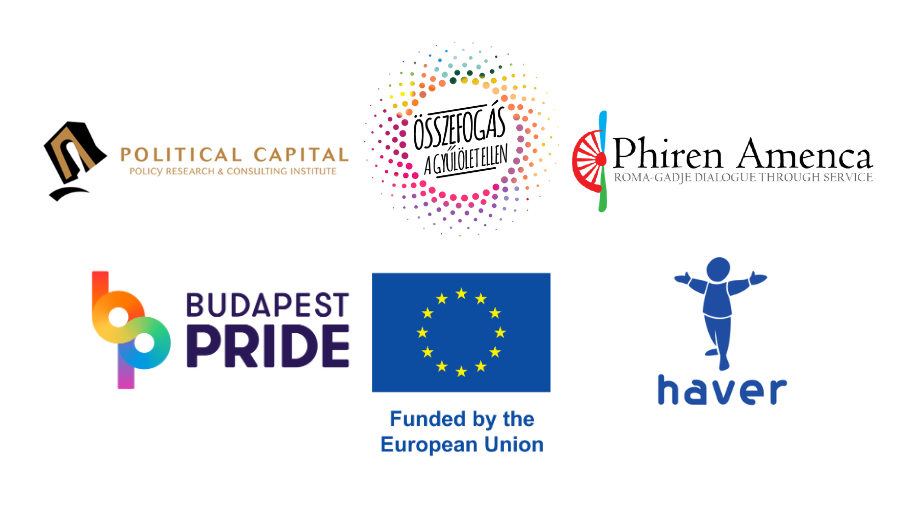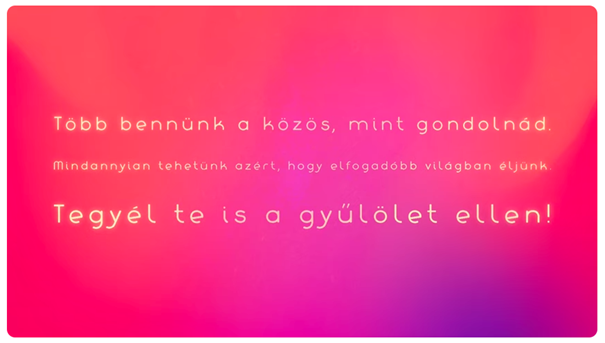Within the CHAD Project, Budapest Pride ran an extensive online campaign in order to raise awareness of the CHAD project and the dangers of online hate speech as well as to build solidarity within and for vulnerable groups targeted by online hate speech and hurtful speech.
The campaign launched following a Counter-narrative training held for the Project consortium and their constituencies, where they analised the most common forms of hateful and hurtful narratives about Roma, LGBTQ+, Jewish and migrant/Muslim communities, and developed alternative narratives as responses.
On July 15, Rainbow Mission Foundation released a short video based on the results and messages of the counter-narrative training. In the campaign video, created by award-winning director Luca Tóth. In the video we see characters from LGBTQ, Roma, Jewish background and characters fleeing from war. As a voiceover, a nationally respected multi-award winning Hungarian actress, Piroska Molnár is reading a poem about love and belonging, from one of the most famous Hungarian poets, Attila József.
The video got 115.000 views on Youtube: https://www.youtube.com/watch?v=eCjkwlSCtXg
The video was shared multiple times on the social media and ran as a TV ad on Hungary’s most popular TV channels.

At the Sziget Festival, part of the in-site campaign, several videos were made with the people visiting Budapest Pride’s CHAD tent. In the first one reflecting on the questions „How does online hate speech affect you?” an person explains that he received numerous hateful comments on his videos about his same sex relationship for over a year. They suggested to others being in similar boats to prioritize themselves and be strong in understanding that the opinions of strangers do not matter: https://www.facebook.com/reel/255689003863097 ; https://www.instagram.com/reel/C0PNGauPVKV/
In the second video the question was „What are the tools vulnerable minorities can use against online hate speech?”. The speaker suggests deleting swear words form comments and banning the commenters immediately. They also mention that the community has a huge role in supporting the victims of hate speech publicly because masses are stronger than individuals alone: https://www.instagram.com/reel/C0LxYWwsxt2/
The third video’s question was „What is your message for victims of hate speech?”. Here, the speaker says that the hateful commenter is a faceless person, wo is brave online, but victims should rather concentrate on and gain strength from the ones physically around, who live and support them.
https://www.facebook.com/reel/999728591133049 ; https://www.instagram.com/reel/CzVhVUKAsi3/
Also at the Sziget Festival, related to one of the public offline actions, portrays of participants holding up the sign „I stand up for minority rights”, promoting the petition and the project were made: https://www.facebook.com/photo/?fbid=741126024726697&set=pcb.741126971393269


In November, we shared 10 supportive public messages that were submitted to the petition website on our social media sites: Budapest Pride – ???? Közel 6000-en írtátok alá a petíciónkat, ami… | Facebook
In July2023, a set of images containing basic information about the negative effects of online hate speech was shared on Budapest Pride’s social media with the following information: Budapest Pride – Miért káros a(z online) gyűlöletbeszéd? ????… | Facebook
„Why is online hate speech harmful?
- they cause pain to the victims
- words are often followed by actions, which can also lead to physical abuse
- Due to the anonymity of the Internet, we often do not know exactly where and from whom the attack is coming from, which makes it more difficult to defend against it.
As you can see, this genre is by no means harmless. Don’t let online hate speech gain ground on social media platforms. If you know, report the given content or comment!”
In November 2023 another series of images were spread on social media raising awareness about the “trolls” of the internet: Budapest Pride – ????♂️ Kik azok a trollok? ???? Mivel a Btk. szerint a… | Facebook
“Who are the trolls?
Since the Civil Code hate speech is directed against communities and groups – less so against individuals and organizations – therefore it is necessary to talk about trolls as a kind of digital phenomena.
According to the Wikipedia article: “Troll in Internet slang is the name of a person who bombards an online community (for example, an Internet forum, chat, blog, mailing list) with messages that do not belong to the subject in a provocative, irritating manner, or who does not tolerate contradiction of his personal religious beliefs, he is hurling it with violent violence, with the specific intention of provoking violent reactions from other users, or in other ways disrupting and making the exchange of ideas on the topic impossible”.
An important basic rule that cannot be said enough is to not feed the troll! The best thing to do if you come across a suspected troll in a comment section is to ignore them. Don’t give him the opportunity or space to hurt you or get into you, because these arguments can easily turn into personal issues!”

The „CHAD – Countering Hate Speech and Hurtful Speech against Diversity: Roma, LGBTIQ, Jewish and Migrant Communities” project (project nr. 101049309) is funded by the Citizens, Equality, Rights and Values Programme (CERV) of the DG Justice, European Commission and coordinated by RGDTS Nonprofit Llc. in partnership with Haver Informal Educational Foundation, Rainbow Mission Foundation and Political Capital. Views and opinions expressed are however those of the author(s) only and do not necessarily reflect those of the European Union or the European Commission. Neither the European Union nor the granting authority can be held responsible for them.


